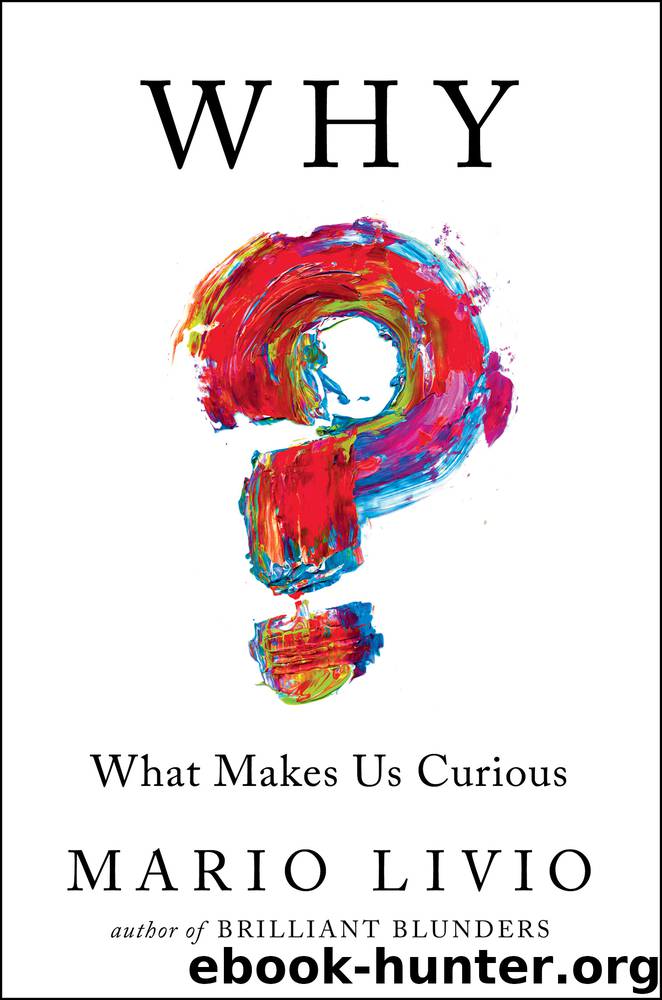Why? by Mario Livio

Author:Mario Livio
Language: eng
Format: epub
Publisher: Simon & Schuster
A Few “Curiosity Revolutions”
University of Oxford evolutionary psychologist Robin Dunbar begins his book Human Evolution with “The story of human evolution has fascinated us like no other: we seem to have an insatiable curiosity about who we are and where we have come from.” Origins have indeed always stimulated curiosity. We strive to understand the origins of our species, of the Earth, and of the universe.
The dramatic increase in the number of neurons endowed Homo sapiens with new cognitive capabilities. In particular, it enabled novel mechanisms for information processing, for learning, and for communication. Eventually, our newly acquired mental apparatus led to the emergence of what we identify as the unique human language, probably sometime between 500,000 and 200,000 years ago. Opinions vary as to whether language appeared on the scene through a long, evolutionary, Darwinian-like process or a rather sudden mutation that instilled the language faculty in the human brain in a phase-transition-like fashion (as in water turning into ice). This debate, while truly fascinating in its own right, is largely beyond the scope of our concerns here. As an amusing aside, let me note that the Linguistic Society of Paris banned research on the origin of language in 1866 precisely because it deemed the problem unsolvable by rigorous scientific methods. This ban reflected the challenging reality that unlike, say, the use of fire, it is virtually impossible to track the development of language by following archaeological relics. I find this 1866 ban amusing because researchers still cannot agree on the theory for the origin of the human language, seemingly confirming the Linguistic Society’s prescient fears.
From the perspective of the present book, the important point is that it appears quite likely that the emergence of the unique human curiosity and emergence of the distinct human language were strongly correlated. Dunbar suggests that the early purpose of a complex vocal language (as opposed to simple sounds) was none other than gossip! That is, rather than merely conveying very rudimentary information, such as “A pack of wolves is approaching,” language was used in larger social groups for descriptive narration, addressing issues beyond the imminently existential but still important for survival. As psychologist Elizabeth Spelke put it, “We can use it [language] to combine anything with anything.” While there is no consensus on the validity of Dunbar’s theory, it hints at an intimate potential connection between curiosity—a key source for gossip—and language. Other theories suggest that language may have evolved for the exchange of different types of social knowledge (such as symbolic social contracts to guarantee the paternity of one’s children). Those theories also contain an important curiosity component. The influential linguist Noam Chomsky does not see language primarily as a means of communication. He contends that “language evolved, and is designed, primarily as an instrument of thought.” In that respect it is interesting to note that in 2016 researchers at the University of California, Berkeley, managed to create an “atlas of the brain” that shows how the meanings of different words are distributed across various regions of the organ.
Download
This site does not store any files on its server. We only index and link to content provided by other sites. Please contact the content providers to delete copyright contents if any and email us, we'll remove relevant links or contents immediately.
| Administration & Medicine Economics | Allied Health Professions |
| Basic Sciences | Dentistry |
| History | Medical Informatics |
| Medicine | Nursing |
| Pharmacology | Psychology |
| Research | Veterinary Medicine |
The Art of Thinking Clearly by Rolf Dobelli(10487)
The 5 Love Languages: The Secret to Love That Lasts by Gary Chapman(9809)
Mindhunter: Inside the FBI's Elite Serial Crime Unit by John E. Douglas & Mark Olshaker(9339)
Becoming Supernatural by Dr. Joe Dispenza(8214)
Nudge - Improving Decisions about Health, Wealth, and Happiness by Thaler Sunstein(7706)
The Road Less Traveled by M. Scott Peck(7601)
Mastermind: How to Think Like Sherlock Holmes by Maria Konnikova(7342)
Enlightenment Now: The Case for Reason, Science, Humanism, and Progress by Steven Pinker(7311)
Win Bigly by Scott Adams(7195)
The Way of Zen by Alan W. Watts(6614)
Factfulness: Ten Reasons We're Wrong About the World – and Why Things Are Better Than You Think by Hans Rosling(4742)
The State of Affairs by Esther Perel(4719)
Gerald's Game by Stephen King(4653)
Man's Search for Meaning by Viktor Frankl(4605)
The Confidence Code by Katty Kay(4260)
Thinking in Bets by Annie Duke(4226)
The Healing Self by Deepak Chopra(3578)
Hidden Persuasion: 33 psychological influence techniques in advertising by Marc Andrews & Matthijs van Leeuwen & Rick van Baaren(3565)
The Worm at the Core by Sheldon Solomon(3486)
